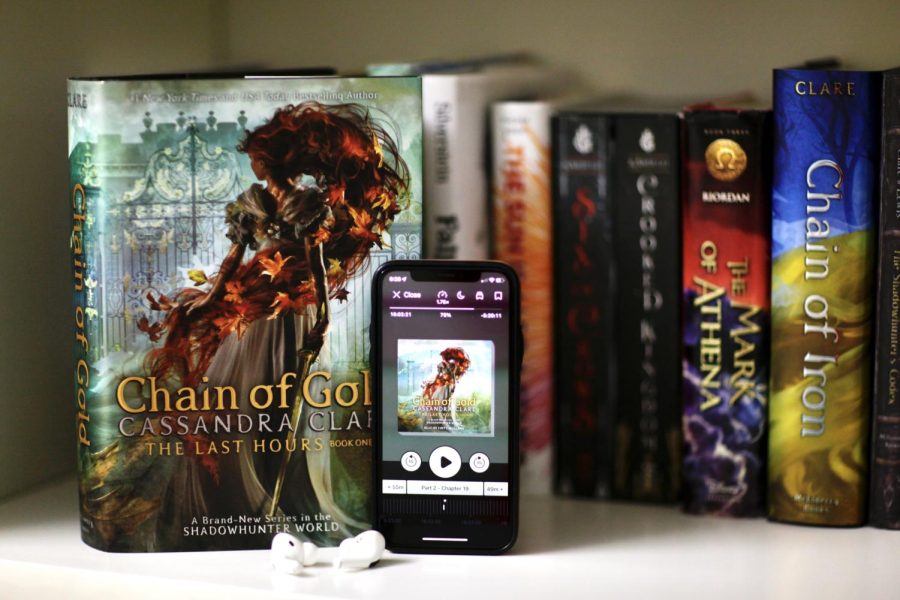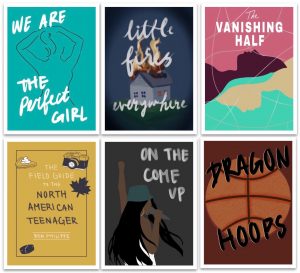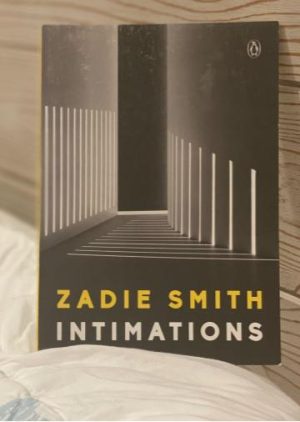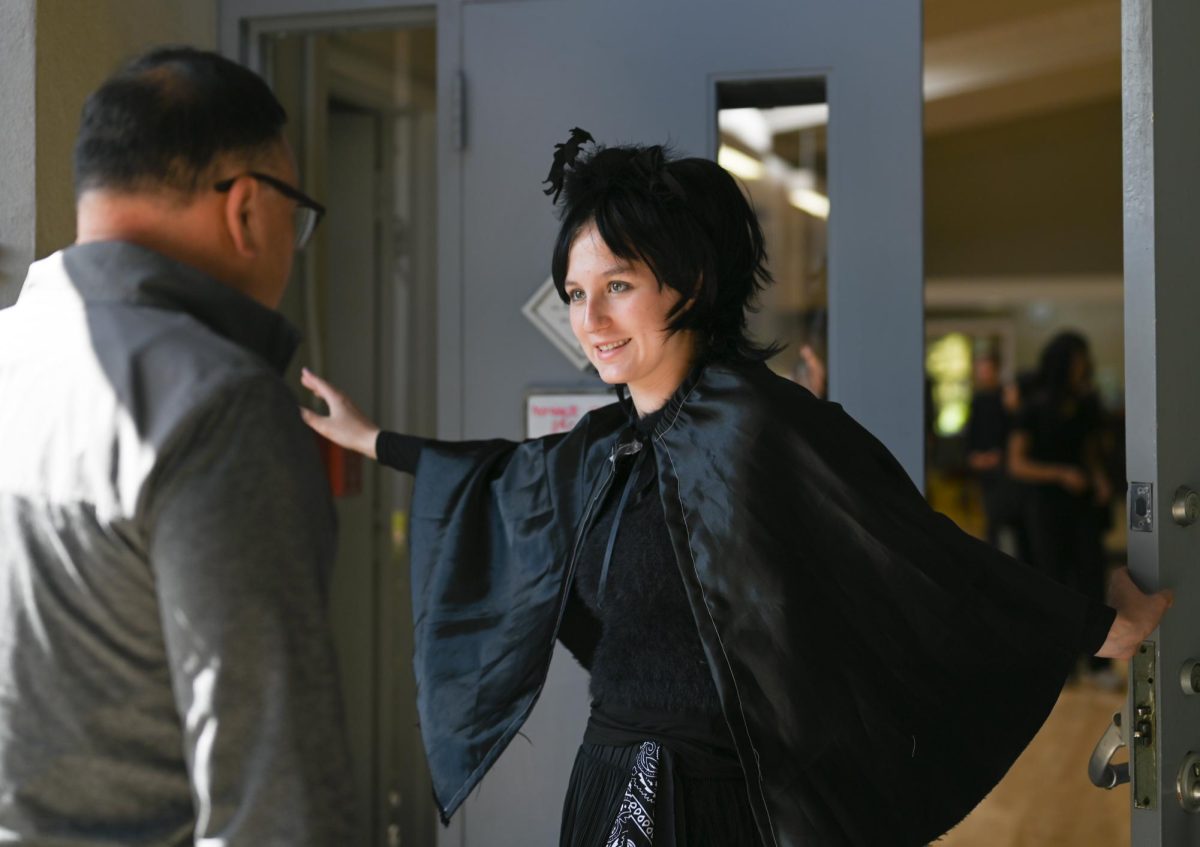Reading audiobooks isn’t cheating
The audiobook edition of “Chain of Gold” by Cassandra Clare borrowed from Sora stands next to the hardcover edition. This novel was the first audiobook I ever listened to, and it introduced me to a new form of consuming media that I had previously shunned due to misconceptions.
December 14, 2021
Listen to the audio reading of the following article at the link below.
“DAYS PAST: 1897,” a voice intoned. “Lucie Herondale was ten years old when she first met the boy in the forest.”
As the narration enveloped me, I closed my eyes and let Finty Williams’ voice immerse me into the Shadowhunter world.
It only took one novel to completely redefine my opinion on audiobooks.
For the first 15 years of my life, I had always believed that listening to the audio version of a book was “cheating,” a lazy way to claim to have read a book without taking the time to pass your eyes over and comprehend the sentences upon sentences, pages upon pages of words. After all, reading a book is a commitment. With your hands, eyes and mind occupied, there isn’t much room to multitask.
Despite my audiobook aversion, I eventually tried one for the first time in March of 2020, driven to desperation over pandemic e-book availability on Sora. With libraries closed and a multi-month wait time for the ebook version of the newly released “Chain of Gold” by Cassandra Clare, I opted to borrow the available audiobook instead. Upon opening the book, I was immediately daunted by the length: 21 hours, 22 minutes, 32 seconds.
As I made my way through the first hour of the novel, a few things became apparent. The most significant: a very precarious multitasking balance was necessary in order for me to properly digest the information.
I couldn’t do too little — sitting with nothing to occupy my hands with while trying to take in the words proved short-lived. I couldn’t do too much — anything that involved more than a little thinking disrupted my listening and forced me to spend the next couple of minutes rewinding and hitting fast-forward to find the exact spot I last heard. But I found my happy zone in activities such as cleaning my room and going for runs.
And so, my previous perception of audiobook users demonstrating a lower commitment to reading shattered. While audiobooks offer more convenience in that some tasks can be done easily while listening, a novel in an audio format still provides the full experience of the content.
Audiobooks force the listener to hear every carefully-selected word. Personally, as a reader, I tend to start skimming when I’m caught up in the action and am eager to uncover what happens next. I don’t even realize how much I’m missing until I reread the novel at a later time and notice details that I didn’t process in the haste of my first read. With the steady pace of an audiobook, the same does not hold true, as the voice actor narrates every word. Plus, if I’m impatient to hear the plot quicker, I can always adjust the speed of the novel to find a good balance: ensuring satisfaction with the speed of the progression but still being able to digest the words.
Academically, I’ve been able to use this audiobook perk to my advantage, electing to complete homework readings for English classes by listening to an audio version while following along with the written text to ensure that I don’t miss the details that my eyes tend to skip over when I rely on reading alone.
“Listening to books instead of reading is cheating,” I had always thought. But I have realized that “cheating” really doesn’t matter.
Yes, audiobooks are ostensibly easier to digest than physical books because language comprehension skills such as understanding tone do not have to be applied, as the narrator does that evaluation and application for you when they read aloud. But “taking a shortcut” by bypassing the tone analysis step is irrelevant. For me, the end goal of reading in my free time is to unwind and get lost in another world or just to learn more about a particular topic. I’m not reading cliché high school romance novels to strengthen my reading comprehension, and so that is not a factor I need to take into consideration when pitting audiobooks against ebooks.
With the unique medium of audio entertainment, there is so much more to explore in regards to how each individual story is told and how multimedia elements can be customized to the storyline. Novels such as Taylor Jenkins Reid’s “Daisy Jones and the Six” feature a full-cast narration, creating an immersive listening experience. In other novels, authors narrate their own work such as Lulu Miller’s “Why Fish Don’t Exist,” adding a more personal touch to the memoir.
At the end of the day, audio and written stories use the same words, and so, I believe that listening is just as valid as reading in consuming literature for entertainment.


















![“[Building nerf blasters] became this outlet of creativity for me that hasn't been matched by anything else. The process [of] making a build complete to your desire is such a painstakingly difficult process, but I've had to learn from [the skills needed from] soldering to proper painting. There's so many different options for everything, if you think about it, it exists. The best part is [that] if it doesn't exist, you can build it yourself," Ishaan Parate said.](https://harkeraquila.com/wp-content/uploads/2022/08/DSC_8149-900x604.jpg)




![“When I came into high school, I was ready to be a follower. But DECA was a game changer for me. It helped me overcome my fear of public speaking, and it's played such a major role in who I've become today. To be able to successfully lead a chapter of 150 students, an officer team and be one of the upperclassmen I once really admired is something I'm [really] proud of,” Anvitha Tummala ('21) said.](https://harkeraquila.com/wp-content/uploads/2021/07/Screen-Shot-2021-07-25-at-9.50.05-AM-900x594.png)







![“I think getting up in the morning and having a sense of purpose [is exciting]. I think without a certain amount of drive, life is kind of obsolete and mundane, and I think having that every single day is what makes each day unique and kind of makes life exciting,” Neymika Jain (12) said.](https://harkeraquila.com/wp-content/uploads/2017/06/Screen-Shot-2017-06-03-at-4.54.16-PM.png)








![“My slogan is ‘slow feet, don’t eat, and I’m hungry.’ You need to run fast to get where you are–you aren't going to get those championships if you aren't fast,” Angel Cervantes (12) said. “I want to do well in school on my tests and in track and win championships for my team. I live by that, [and] I can do that anywhere: in the classroom or on the field.”](https://harkeraquila.com/wp-content/uploads/2018/06/DSC5146-900x601.jpg)
![“[Volleyball has] taught me how to fall correctly, and another thing it taught is that you don’t have to be the best at something to be good at it. If you just hit the ball in a smart way, then it still scores points and you’re good at it. You could be a background player and still make a much bigger impact on the team than you would think,” Anya Gert (’20) said.](https://harkeraquila.com/wp-content/uploads/2020/06/AnnaGert_JinTuan_HoHPhotoEdited-600x900.jpeg)

![“I'm not nearly there yet, but [my confidence has] definitely been getting better since I was pretty shy and timid coming into Harker my freshman year. I know that there's a lot of people that are really confident in what they do, and I really admire them. Everyone's so driven and that has really pushed me to kind of try to find my own place in high school and be more confident,” Alyssa Huang (’20) said.](https://harkeraquila.com/wp-content/uploads/2020/06/AlyssaHuang_EmilyChen_HoHPhoto-900x749.jpeg)















